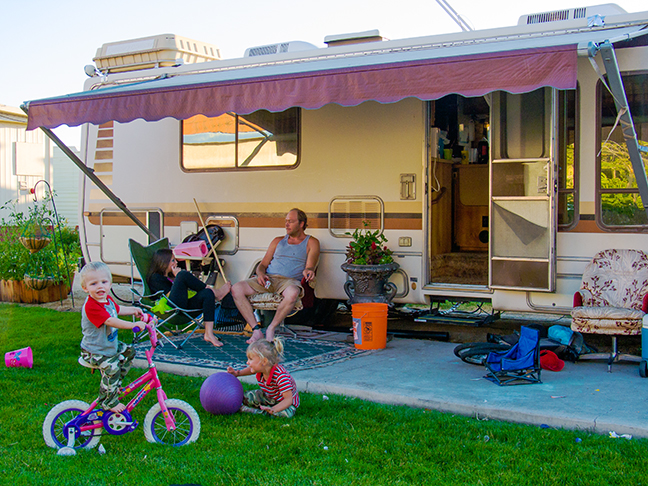
Take a look at this picture. Happy family on summer holiday, touring the country? No, I don't think so. Pictured is a long term trailer park. Some of its inhabitants have lived there for years. Sometimes only the trailers have. Residents sell them and move away or just rent them to people looking for an affordable place to stay while regaining their footing. In this case, the family is living in an RV. It's their home and they've settled in this trailer park for the time being. The town is a gambling/tourist trap with only a smattering of surrounding industry. The two adults likely have jobs at one of the local casinos. They may or not be married to each other. They both have their shoes off, so they are likely living together or, at minimum, sleeping together. As to the kids being theirs, that seems doubtful. The kids are both blond while only the dad is blond. His from a previous marriage gone sour? Most likely, though their birth mother could have died. The kids seem happy and healthy no matter what the adult relationship is. And that's a good sign. Kids are so often a barometer of how well an adult relationship is going. Kudos to this dad for keeping things feeling normal. And kudos to his girl friend/possible wife/their current mom for not disrupting things for either the kids or the dad. (But there is an error of omission in that analysis. Please see the comment section.) When people speak of "normalcy", what exactly do they mean? It's not a statistical thing. People don't do least mean square and standard deviation calculations in their head. They measure normalcy by their personal feelings of discomfort in comparison to what they see around them, some of which they take as "good examples" and some as "bad examples". Finding a zone of relative comfort, a zone where things are not too difficult but bearable, where one does not feel out of place to one's surroundings, where one begins to feel capable, able to go on, able to take a relaxing breather now and then, able to appreciate some joy in things, things like one's kids' development. That, I believe, would be close to what most would call "normalcy". So, how does one get there? Now that's a question not easily answered. Sociologists would tell you education is the key. The more of it you have the better off you'll be. But with today's rising cost of education, more and more young people are questioning whether they might not do better without it and all the debt it brings on. Some folks will tell you religion is the key. "Give your life to the Lord and He will show you the way." For some, that may actually work. But with more and more scandalous stories coming out about fraud, corruption, and exploitation within faith based organizations, there is good reason to doubt the reliability of that particular answer. Interestingly, there seems to be a significant portion of our population that has taken to believing the answer is to "watch out for one's self first and foremost". At least some of those folks point to Charles Darwin, Ayn Rand, and Milton Friedman to justify their position, suggesting survival of the fittest is ample justification for selfishness and that helping others only helps those others become dependent, not independently viable. Even so, there still seems to be a significant portion of the population that believes membership in a community is the most viable path to normalcy. Witness the expansive growth of Facebook and the huge numbers of people who attend church regularly, not for the religion but for the involvement in a community. Communities tune one's sense of proportion, inspire one's sense of the possible, connect one to resources, both material and non-material, and can also provide a safety net during times difficult and in transition. There are also many false paths people attempt to take toward normalcy. Drugs, alcohol, gambling, abusive controlling exploitive behavior, crime, begging, and sloth are among the most common. Whatever path is chosen, there is going to be struggle. It's not even always clear that normalcy is what one is looking for. Sometimes one needs to stumble upon normalcy to get a sense of what it actually feels like before one can begin to understand what is missing from one's life. Only then does the struggle to get there begin in earnest. And always always, along the way, there is the necessity for compromise, both in negotiations with others and in learning to accept and deal with one's own limitations and potentials. One cannot draw upon resources from others, within a community or within a marketplace, unless one has something of value to offer in return. Finding and developing what one has to offer becomes the crux of the problem of trying to achieve normalcy. Far easier to discover what one desires from others. May you never fail to appreciate and develop what uniquely you have to offer in your struggle to achieve normalcy. |
• Posted: Aug 18, 2013 20:33:23
• Comments Welcome
• Vote CoolPhotoblogs
• Purchase a Print
• Share
Thursday, August 11th, 2011 Sparks NV USA DMC-FZ50 9.6 mm 45 mm 1/100 sec f 4 100 |